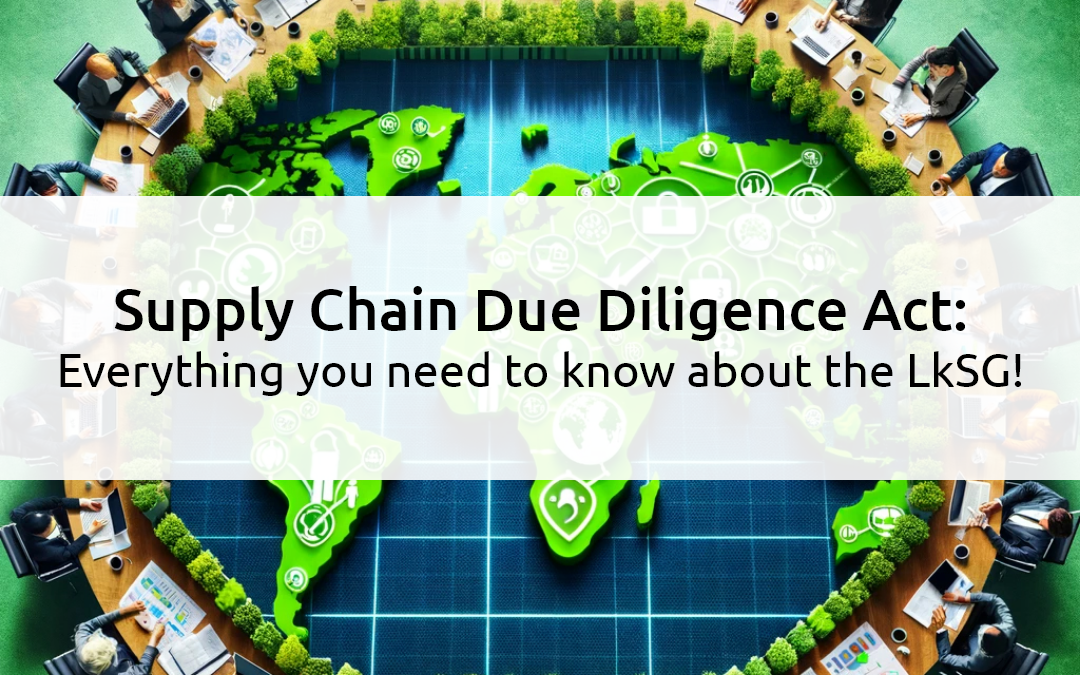What is the Supply Chain Due Diligence Act (SCA) and why is it so important?
The German Supply Chain Due Diligence Act (LkSG) is of crucial importance for the SAP environment, as it obliges companies to uphold human rights and environmental standards in their global supply chains. It requires the identification, mitigation and reporting of risks. Compliance with this law not only contributes to legal certainty, but also strengthens brand trust and promotes sustainable business practices.
Core contents of the supply chain law
The Supply Chain Due Diligence Act (LkSG) obliges companies to comply with due diligence obligations in their supply chains in order to prevent serious abuses such as child labor, forced labor and environmental destruction. The central requirements of the law include:
- Risk analysis: Companies are required to regularly identify potential risks to human rights and the environment in their supply chain.
- Preventive measures: A risk management system must be established and implemented that is designed to avoid or minimize identified risks.
- Remedial measures: Immediate action must be taken in the event of breaches of the defined due diligence obligations.
- Transparency and reporting: Companies are obliged to report annually on compliance with their due diligence obligations and to make the results publicly available.
Companies obliged to implement the Supply Chain Due Diligence Act
The Supply Chain Due Diligence Act (LkSG) is aimed at larger companies with the following criteria:
- Large companies: Companies with at least 3,000 employees in Germany are obliged to meet the requirements of the law. From 2024, this threshold will be lowered to companies with at least 1,000 employees.
- Cross-industry application: The law is sector-independent and therefore affects companies from all sectors that exceed the employee threshold.
- International supply chains: Companies with significant international supply chains must align not only their own business practices but also those of their direct and indirect suppliers with the requirements of the LkSG.
- Contractual partners: Companies are also obliged to require their contractual partners to comply with due diligence obligations. This may require the review and adaptation of existing contracts to ensure compliance.
Companies subject to the Supply Chain Due Diligence Act (LkSG)
Companies that must implement the Supply Chain Due Diligence Act (LkSG) are those that meet the above criteria. This includes both domestic companies and foreign companies with significant business activities in Germany.
The Supply Chain Due Diligence Act (LkSG) in SAP poses specific challenges for companies that use SAP systems:
- Data integration: SAP systems must be able to integrate and record data from various parts of the supply chain. This includes information on suppliers, subcontractors, and compliance with environmental and human rights standards.
- Compliance reporting: Companies must be able to use SAP to create verifiable compliance reports that contain all the information required by the Supply Chain Due Diligence Act (LkSG).
- Risk management: SAP systems should be used to identify and manage risks in the supply chain, particularly those relating to human rights and environmental standards.
- Automation of processes: SAP can help automate monitoring and compliance processes to ensure continuous compliance with the Supply Chain Due Diligence Act (LkSG). These requirements often mean additional customization and investment in SAP systems to meet legal requirements.
Conclusion
The Supply Chain Due Diligence Act (LkSG) marks a crucial step towards a more responsible global economy. With the introduction of this law, companies are expected to scrutinize not only their direct business relationships, but also their entire supply chains. This includes the monitoring and improvement of working conditions, compliance with human rights and environmental protection. The Supply Chain Due Diligence Act (LkSG) helps to ensure that companies play a more active role in combating abuses such as exploitation and environmental destruction. Although this means additional requirements and possibly higher costs for companies, it also offers the opportunity to strengthen consumer confidence and position their own brand as responsible and sustainable. Ultimately, the Supply Chain Due Diligence Act (LkSG) shows that economic success and ethical behavior can go hand in hand, setting new standards for global business practice.
